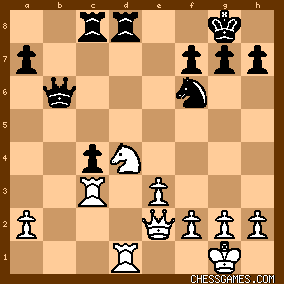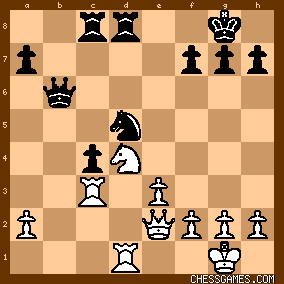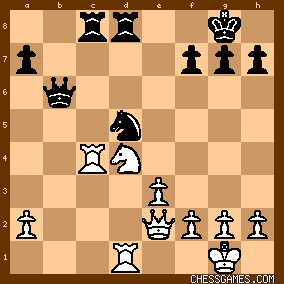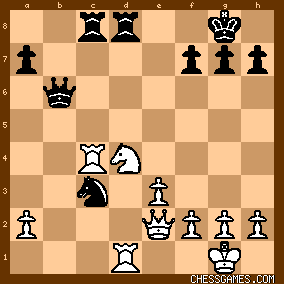|
< Earlier Kibitzing · PAGE 4 OF 7 ·
Later Kibitzing> |
| Jan-16-09 | | Karpova: <peirce>
After 30.Qe1 White loses his rook to 30...Qxc3 (31.Qxc3 Rd1+ 32.Qe1 Rxe1#). |
|
| Jan-16-09 | | AnalyzeThis: < Can anyone explain the move 17 ...
Bb4 to me?>
Just that it's the sort of move the grandmaster makes, and we don't. |
|
| Feb-28-09 | | Ragh: 29..Qb2 is beautiful!! It looks simple but difficult to spot for beginners or even for the experts. |
|
| Apr-18-09 | | notyetagm: O Bernstein vs Capablanca, 1914 21 ... ?

click for larger view21 ... ♘f6-d5!

click for larger view(VAR)
22 ♖c3xc4? <line-opening: c8-c3>

click for larger view
22 ... ♘d5-c3! <x-ray: c8-c3; fork: e2,d1>

click for larger viewGame Collection: Opening lines for your *opponent's* line pieces
22 Rc3xc4? opens c-file for the Black c8-rook to get at c3-forking square, 22 ... Nd5-c3!  Game Collection: Sacrificing material for *OPEN* *LINES*
21 .. Nf6-d5! sacs Black c4-pawn so Black c8-rook can get at c3-forking square for 22 ... Nd5-c3! |
|
| May-24-09 | | WhiteRook48: 29....Qb2!!! |
|
| Sep-01-09 | | birthtimes: According to Capa, 17...Bb4 was made in order to take the knight at a proper time and force a passed pawn. |
|
| Sep-02-09 | | bradfooks: what would be the black ending after 29 Qb2 30 Qf1 |
|
| Sep-02-09 | | sfeuler: <bradfooks> How about 30...Qxc3 and wins? |
|
| Sep-02-09 | | Whitehat1963: Capablanca's 29...Qb2 is one of the great moves in chess history, of course. What are some of the other obvious candidates? A few that come readily to mind, of course: Fischer's 17...Be6 against Donald Byrne, Rubinstein's 22...Rxc3 against Rotlewi, Marshall's 23...Qg3 against Levitsky, but I'll nominate a more obscure one: Maroczy's 19. dxe6. Other nominees, both obvious and less well known? |
|
Sep-02-09
 | | tamar: <Capablanca's 29...Qb2 is one of the great moves in chess history, of course. What are some of the other obvious candidates?> Botvinnik's 30 Ba3! versus Capablanca at AVRO is well known, but still startling. Botvinnik vs Capablanca, 1938 |
|
| Sep-02-09 | | Whitehat1963: By the way, my nomination of Maroczy's 19. dxe6 was against Schiffers. |
|
| Sep-02-09 | | Whitehat1963: I think it would be cool for Chessgames to have a poll or something to find out what members think are the 100 greatest moves in chess history. Those mentioned above might all make the list. |
|
Sep-02-09
 | | tamar: For sheer shock value, 31...R8e4 in Kramnik vs Shirov, 1994

click for larger view |
|
| Sep-02-09 | | Whitehat1963: Good choice. I also love Shirov's 33....Qxd5 in this game: Y A Saksis vs Shirov, 1985 |
|
| Sep-02-09 | | Whitehat1963: And I love Capa's 17. Rxd6! in this game: Capablanca vs M Fonaroff, 1918 |
|
| Sep-02-09 | | visayanbraindoctor: The most stunning move that I have ever seen is Kramnik's 18...Bh6 in M Brodsky vs Kramnik, 1991 Kramnik must have been only 15 years old. Any 15 year old able to play such moves in such a game must become world champion some day. |
|
Sep-02-09
 | | tamar: Pillsbury's 27 R4-f2 is the stunner in a series of "all in" moves in Pillsbury vs Schiffers, 1898 |
|
| Sep-02-09 | | visayanbraindoctor: If the criterion is beauty, Marshall's last move 23.. Qg3 in S Levitsky vs Marshall, 1912 must be considered. |
|
Sep-02-09
 | | tpstar: Tim Krabbe has an interesting compilation of the "Top 110 Most Fantastic Moves Ever Played" and places 16 ... Nc6 in Averbakh vs Spassky, 1956 as #1. http://www.xs4all.nl/~timkr/chess/f... |
|
| Sep-02-09 | | visayanbraindoctor: If we consider the case of a SERIES of beautiful and stunning moves, then this is my favorite. Rotlewi vs Rubinstein, 1907
22..Rxc3 23..Rd2 24..Bxe4+ 25..Rh3 |
|
| Sep-03-09 | | bradfooks: After 30 Qf1 Qxc3 31 h3 what would black play? |
|
| Sep-03-09 | | Whitehat1963: At that point <bradfooks>, I think even I might be willing to play black's position against Rybka or anyone else. It would be just a matter of time. But, if you're being serious: After 30. Qf1 Qxc3 31. h3, how about 31...Qc2 with the intent of 32...Rd1 (threatening the queen)? After that, white's a-pawn is history. No grandmaster would play on. Only a computer would. Sooner or later, black would force an exchange and be left with either a queen or a rook to the good. Either way, white is finished. Bernstein knew it was over, so he wisely resigned. |
|
Sep-03-09
 | | paulalbert: <bradfooks> Are you overlooking that Black is ahead a whole Rook after Qxc3? Even if White avoids an immediate mate or loss of the Queen, Black has numerous routine plans to win this. That's why Bernstein resigned. Paul Albert |
|
| Nov-21-09 | | MaczynskiPratten: For completeness maybe we should list all White's possible defences after 29...Qb2!! If 30 Qxb2 Rd1#.
If 30 Qc2 Qxc2 31 Rxc2 Rd1#.
If 30 Qd3 Qa1+ 31 Qf1 Qxc3 wins a Rook.
If 30 Qe1 Qxc3 wins a Rook (31. Qxc3 Rd1+ 32. Qe1 Rxe1#). If 30 Rb3 Qxe2 wins a Queen.
If 30 Rc2 Qb1+ 31 Qf1 Qxc2 wins a Rook.
If 30 Rd3 Qb1+ 31 Qf1 Qxd3 wins a Rook.
If 30 Rc8 Qb1+ 31 Qf1 Qxf1+ 32 Kxf1 Rxc8 wins a Rook. "Bernstein tried none of these lines. He resigned, as playing even one more move would have been an anticlimax." (Chernev). Kudos to Bernstein for artistic appreciation. Note that several of the lines above require a precise winning move by Black because of the danger of being mated on his own back rank. |
|
Nov-24-09
 | | maxi: In my understanding Capa was not particularly proud of this game. The Bernstein game he was proud of was the other 1914 game, the one in St. Petersburg, Capablanca vs O Bernstein, 1914, which he also won and considered one of his most complex combinations. |
|
 |
 |
|
< Earlier Kibitzing · PAGE 4 OF 7 ·
Later Kibitzing> |





